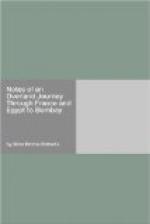The furniture in the Pasha’s palace, though in a great measure limited to carpets and cushions, is very handsome. The divans are covered with rich brocade, figured satin, damask, or cut velvet. The attendants drew aside, with great pride, the curtains which concealed the looking-glasses, evidently fancying that we had never beheld mirrors of such magnitude in our lives. I observed that the chandeliers in some of the apartments did not match each other, but the whole was very creditable to the taste and spirit of the owner. Below them was a handsome apartment entirely lined with marble, and apparently designed as a retreat for the hot weather, the floor being divided into two parts—the one ascended by a step, in which the family might repose upon cushions; the other scooped into basins, with a fountain to play in the centre: the water either had not as yet been laid on, or the season did not render it necessary. Near to this apartment was the Pasha’s bed-chamber, a fine room, also lined with marble, and containing a fire-place, which in the warm weather revolved upon a pivot, and was concealed in a recess made on purpose in the wall. The bathing-rooms, close at hand, were of the most beautiful description, the principal apartment and the antechamber having roofs which might serve as models for all erections of the kind. These were fretted in small compartments, light being admitted by a thick piece of ground-glass in the centre of each, thus securing the utmost privacy, together with one of the most beautiful methods of lighting possible.
While we were still sitting in the Pasha’s palace, the military band of the garrison began to play upon the parade-ground immediately below. Mohammed, who seemed to be quite at home, conducted us to an apartment which overlooked this space, opened one of the windows, and requested us to seat ourselves upon the cushions, where we remained for some time, listening to the well-known French airs played in the court-yard of the palace of a Turkish prince! The band was not a very large one, but the performers had been well-taught, and the wind-instruments produced in such a situation a very animating effect. They marched up and down the parade-ground, occasionally relieved by the drums and fifes also playing French music. The performers were clothed in white, like the men belonging to the ranks, and had the same soiled appearance, it being impossible to keep white garments pure in the dust of Egyptian cities.




